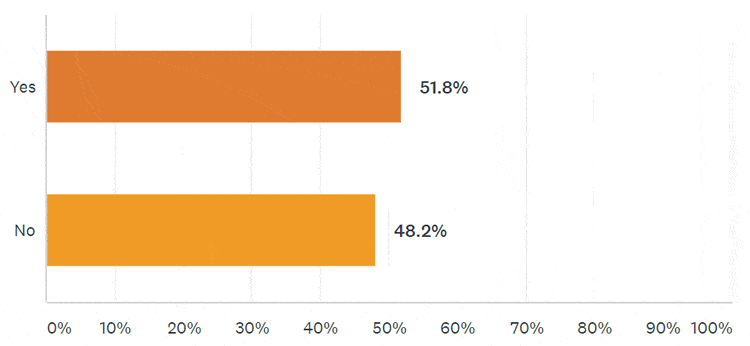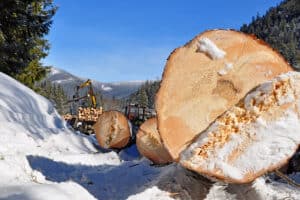The December LANDTHINK Pulse revealed 51.8% of respondents think that in light of recent natural disasters, the U.S. government should subsidize timber owners as they do traditional farmers. After months of wondering if it could be done, last December Congress passed a new $867 billion farm bill. Lawmakers faced increasing pressure from farmers and farm groups who suffered a decline in commodity prices amid President Trump’s ongoing trade war with China. Many americans, however, feel the new five-year farm bill is a disaster, and the trade war with China cannot be assigned the sole blame. Farm Bill 2018 allocates billions of dollars in subsidies to American farmers, and leaves taxpayers on the hook for the next five years. The Farm Bill was originally created in 1933 as part of President Franklin D. Roosevelt’s Agricultural Adjustment Act, to address the needs of the poor as the country emerged from the Great Depression. It protects against farm losses due to natural disasters through disaster assistance and crop insurance.
Last month, the December Pulse asked: Considering recent natural disasters, do you believe the U.S. government should subsidize timber owners in times of disaster like they do traditional farmers?
December Pulse Sponsored by
The U.S. was hard hit by natural disasters in 2018. Millions of acres of both public and private timberland over large swaths of the West were destroyed in what was one of the costliest and most destructive wildfire seasons on record. Two major hurricanes struck the U.S. in 2018 (Florence and Michael), devastating the agricultural industry and timberland markets in Georgia, the Carolinas, Alabama and Florida. According to the United States Department of Agriculture (USDA), the estimated timber damage in Florida alone was over $1 billion, and NC State University reports that Florence caused “over $70 million in significant damage to forest and timber land through wind and flooding” in that state. The hurricane devastation disrupted the supply chain, from timberland owners to loggers to mills.
After the hurricanes, state governments offered assistance with salvage operations and some programs were available to provide assistance with replanting. But unlike farmers, the vast majority of timberland owners have no recourse after suffering a catastrophic loss, because timber is not eligible for federal crop insurance and private sector insurance is expensive and leave large coverage gaps. In addition to hurricanes, timberland is subject to a variety of other threats such as insects, fire and disease.
In February 2018, Congressman Earl L. “Buddy” Carter (R-Ga.) introduced legislation, the Forest Recovery Act, to protect timber land owners in times of catastrophic loss. The legislation allows individuals or businesses growing timber for sale to deduct up to the fair market value lost after a catastrophic event. It would require farmers to reforest within five years to gain the deduction, subsequently helping the environments, rural economies, and ensuring more timber farms remain viable.
“Timber takes 20 to 80 years before it is able to be cut and sold,” Carter said in a press release published on his website. “This makes it extremely difficult for timber farmers to recover after a catastrophic loss. Unfortunately, the current system provides no recourse for these farmers during times of catastrophic loss. This is pushing farmers away from timber farming, limiting available forest products, hurting rural economies, and fails to protect our environment.”
Farm subsidies have always been a hot button political issue, especially when a new farm bill debate starts heating up. There are certainly strong arguments both for and against subsidies. Some people hold the opinion that the 2018 Farm Bill expanded the loopholes on farm subsidies, and the farmers who need the money are often not the ones getting the subsidies, but rather large corporations. According to USDA ERS, farm incomes in 2017 were 32% higher than average U.S. household incomes– higher than the taxpayers subsiding them- while about 60% of subsidies for the three main farm programs went to the biggest 10% of farms. Some argue that agriculture and timber farms in the U.S. are owned by a small elite, and subsidizing them amounts to nothing more than corporate welfare.
Here are the December Pulse final results:

We were pleased with the large number of Pulse responses, and we thank everyone who answered the Pulse and shared it on social media with friends and connections in the land industry. LANDTHINK would like to extend a big thank you to Matre Forestry Consulting for sponsoring the December Pulse and for coming up with a very interesting question to pose to our audience. Matre Forestry Consulting specializes in land sales and acquisitions, timber sales, and forestry services in Southwest Georgia, Southeast Alabama, and beyond. Headquartered in Albany, Georgia, Matre Forestry provides complete land and timber management services and expert real estate brokerage services.
Become a Pulse sponsor! It’s a great way to ensure your brokerage is the first one buyers and sellers call when they have a need to buy or sell property. You’ll get insane exposure on Social + Email + Web. That’s 500,000+ monthly eyes on you! Once you have it, you won’t want to give it up! Pulse sponsorships are offered on a first come first serve basis and are subject to certain limitations. If your business would be interested in sponsoring the February Pulse, please contact us soon.
Do you have a suggestion for next month’s Pulse question? Submit your question and we might choose yours!
We want to know what you think about our January Pulse question, chosen and sponsored by First South Farm Credit. How are you most likely to begin the land financing process? Answer now.
This content may not be used or reproduced in any manner whatsoever, in part or in whole, without written permission of LANDTHINK. Use of this content without permission is a violation of federal copyright law. The articles, posts, comments, opinions and information provided by LANDTHINK are for informational and research purposes only and DOES NOT substitute or coincide with the advice of an attorney, accountant, real estate broker or any other licensed real estate professional. LANDTHINK strongly advises visitors and readers to seek their own professional guidance and advice related to buying, investing in or selling real estate.











Add Comment